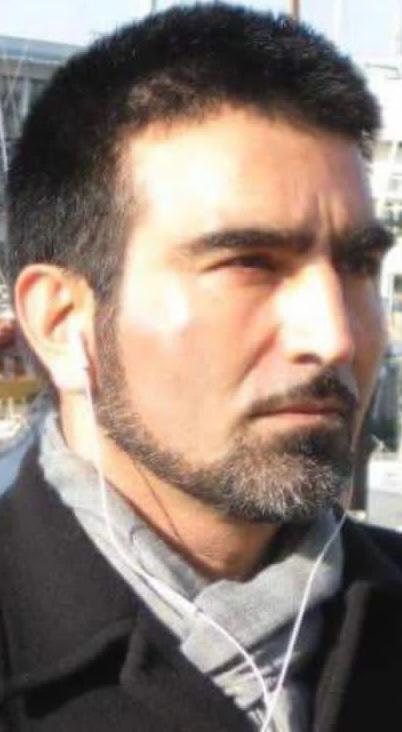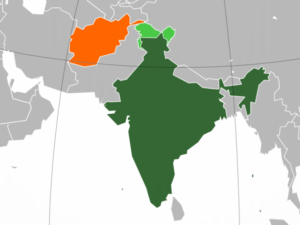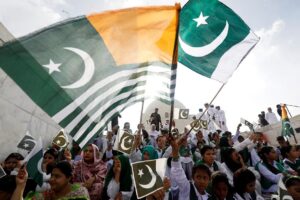By Farooq Kirmani
Soon after Russia’s invasion of Ukraine on 24th of February 2022, Imran Khan, the then PM of Pakistan, addressing a mammoth public rally on 6th March 2022, responding to a letter written by 22 heads of diplomatic missions demanding Pakistan NOT to stay neutral in Russo-Ukrainian war, said, “EU ambassadors have written a letter asking us to condemn Russia. I want to ask if you have written any such letter to India … Are we some slaves [and] do anything you say … When India violated international laws in occupied Kashmir, did any one of you sever ties with India or halt trade”. Just one day after that, on 7th March 2022, came the infamous meeting in Washington where, according to a hotly contested cypher, a minor US functionary threatened Pakistan saying, “I think if the no-confidence vote against the Prime Minister [Imran Khan] succeeds, all will be forgiven in Washington … Otherwise, I think it will be tough going ahead”. On 10th April 2022, the PM was removed by a Supreme Court enabled no-confidence vote in the parliament.
In the subsequent tsunami of unprecedented public revulsion against the regime change, fuelled by the mystery clouding the actual facts at that point of time, all sorts of conspiracy theories were tossed around. A very small minority of rational idealists in the country seemed unenthusiastic to subscribe to the view that the regime change happened due to foreign interference: inspite of being very clear-eyed about the realpolitik in international affairs, it was hard to comprehend that in 21st century any power on earth could so easily compel a nuclear power to replace an elected and extremely popular head of a government with a rag-tag bunch of politico-religious bilkers in just seven weeks.
For the rational lot, the regime change was simply the handiwork of some treacherous General who was threatened by a really popular charismatic leader, an Oxonian with Western temperament but Eastern values, one who wears his Islamic faith on his sleeve and openly talks about creating a welfare state, based on Madinah model, in Pakistan.
It was on 3rd August 2023, well before the veracity of the scandalous cypher was established, the BBC in its flagship programme, HARDtalk, hosted Imran Khan. Watching the interview, like gory porn, gave you creeps. The intro, the line of questioning, the wording of the questions, coercive suggestions etc. all stank of crude and nude spin, as if scripted by some MI6 team tasked to crush the PTI and create a ‘level playing field’ where some crock of shite could be sparkled and sprung to PM’s chair. In a nutshell, the interview was like showcasing Churchill as a warmonger simply because he went to war with Hitler for liberty, freedom and independence instead of saving lives and resources. Incidentally, two days after the broadcast, on 5th of August 2023, Imran Khan was arrested after a court sentenced him to three years in jail. Actually, the episode reminded you of another BBC programme, Dateline London, broadcast a few days after the military coup in Egypt, where an Egyptian journalist was allowed to display unauthorised, unmarked, unverified, ‘top-secret documents’ indicting Muslim Brotherhood that were found on roadside in Cairo? This HARDtalk episode was a subtle reminder to the idealists in developing world that the Western imperialism was alive and kicking in the 21st century.
In order to bring home the palpable malice behind the Hard-talk episode, a good thought experiment would be to replace Imran Khan with Volodymyr Zelensky and imagine putting the same questions, we bit paraphrased, to him and see how preposterous the questions sound! Here goes.
Welcome to Hard Talk from the BBC World Service, with me Stephen Sucker. My guest today is, according to the opinion polls, comfortably Ukraine’s most popular politician, with parliamentary elections due to be held this coming autumn that ought to make Volodymyr Zelensky favourite to retain the premiership. But nothing in Ukraine right now is that straightforward. In fact, Volodymyr Zelensky is facing myriad challenges. His country is in disarray. Dozens of its senior figures have been neutralised in the tumultuous events since February 2022 when Ukrainians started resistance and were involved in violent attacks, including some directed at the Russian military targets. Now, it’s unclear whether Mr. Zelenskyy will survive and be allowed to stand, and to many Ukrainians and Europeans, it’s unclear whether democracy and national security can be maintained in the current febrile atmosphere. Is Volodymyr Zelensky living proof of that old adage, what goes around comes round? Well, he joins me now on the line from Kiev.
Q1. Welcome to Hard Talk. From the outside, Mr. Zelenskyy it looks as though a military noose is tightening around your neck. Does it feel that way to you?
Q2. Yeah, you talk about setbacks. Isn’t the reality, now that there are these huge areas like Donetsk, Kherson, Luhansk, and Zaporizhzhia under Russian control and hundreds of thousands of Ukrainians have been killed and Billions of dollars of Western money sunk in this unwinnable war? It’s becoming so complex and so serious that frankly you don’t have resources to defend your country anymore.
Q3. I’m sure you’re familiar with, uh, the notion of karma and the phrase, what goes around comes around. Would you accept that one problem for you is that the positions you stake out today are very different from the positions you’ve taken in the past? And when I say that, I’m thinking, number one, of your enthusiasm Uh, for the West to challenge and confront Putin and impose stringent sanctions on Russia and bring Putin to face trial in ICJ. Now that the sanctions have failed and damaged the European countries more than Russia; given the allegations of wartime crimes against you (your own NABU launched nearly 300 cases and sent 58 indictments to court). You said the international courts had every right to prosecute corrupt leaders and now given the alleged wartime crimes, the same international courts may well be going to sanction you. So it’s going to be difficult for you to argue that the international courts have no right to do that.
Q4. Would you accept that you’ve made several grave errors in the recent past? Perhaps one of your most serious errors was fermenting an atmosphere in which you encouraged hostility toward the Russian military. And when you were attacked in 2022, your supporters, the patriotic Ukrainians, immediately took up arms and started violent resistance, which included violence directed against the Russian military targets, including the headquarters of Russia’s Black Sea Fleet. They are your people responding to your rhetoric.
Q5. But hang on, did you not think for a moment, knowing Russia as you do, the polarized feelings amongst your people, did you not think for a moment it was irresponsible of you in the months running up to events this year to be accusing the Russian military of essentially running a puppet governments, of launching a coup d’etat of taking over huge chunks of Ukraine and completely undermining its democracy. Did you not for a moment think that that might lead to trouble?
Q6. Well, no one. I talked about karma. Yeah, I talked about karma before. The truth is you rode the tiger of Western military support for your country. You rode that tiger yourself. You were close to the Western governments. You remained close to the Western intelligence services and the military all through your years in power. Well-meaning people in the world are aghast at the Nazi sentiment and movement in Ukraine with whom you seem to be hands-in-glove with and now whatever is happening in Ukraine, to Ukraine, or may happen in future is all on you. You cannot blame your Western allies for your failures. It’s hypocrisy. One of the Russian army spokespeople said Volodymyr Zelensky is the biggest hypocrite.
Q7. Isn’t the truth, though, that after you lost huge chunks of the country in war, you believed you could use people power to force the Russian army to go back in essence and you were wrong. And going back to what happened in 2022 when your supporters took up arms, they committed that violence, including against key Russian military infrastructure, you basically crossed a red line, a red line that even supporters of your own country, even former friends and colleagues in EU say is on you. It’s your responsibility, one of your former supporter, Poland’s PM Mateusz Morawiecki, accused you of insulting Poles in United Nations address. There are many in European capitals who hold you responsible for not only the loss of life and destruction inside Ukraine but also for the financial damages in Europe.
Q8. Of your alliance, some of your most ardent supporters like the NSA, Jake Sullivan, said the U.S. “deserves a degree of gratitude” from you for the billions in U.S. taxpayer dollars.
Q9. But that’s the point. That’s the point. Hang on. We don’t have much time. Let’s keep some brief questions and answers. The British Defense Secretary, Ben Wallace, also suggested that Ukraine had not expressed sufficient “gratitude” for Western financial support. Professor Tim Willasey-Wilsey highlights that “… the West is likely to pressure President Volodymyr Zelensky to negotiate with Putin. But an acceptable negotiated outcome will be almost impossible to achieve. Following Putin’s recent diplomatic successes, the West can ill afford another foreign policy failure.” As somebody mentioned, the country is on the brink of a terrible crisis, and it’s incumbent upon you to put your own ego and interests aside and reach out to Putin and others. Are you prepared to do that?
Q10. You right now are sitting in Kiev. Every time you try to leave your home, you have to negotiate all of the armed guards and the security that surrounds you. You know that you survived an assassination attempt last November but you’ve said you expect another one to come. I believe your own children have told you that you ought to get out of politics for your own safety. Why will you not heed that advice? Because it may be the only way to calm tensions in your country.
Q11. You won’t accept that you’ve made a series of allegations about this government, which of course, the current Russian government would absolutely deny. But what is clear is that if elections are to be held this year, you have a choice. You either try to run or you back off because it could send Ukraine over the edge. What are you going to do? What will save Ukraine or free and fair elections?
Thanks very much for joining me on Hard Talk.
The views expressed in this article belong to the author alone and do not necessarily belong to The Global Politico.







